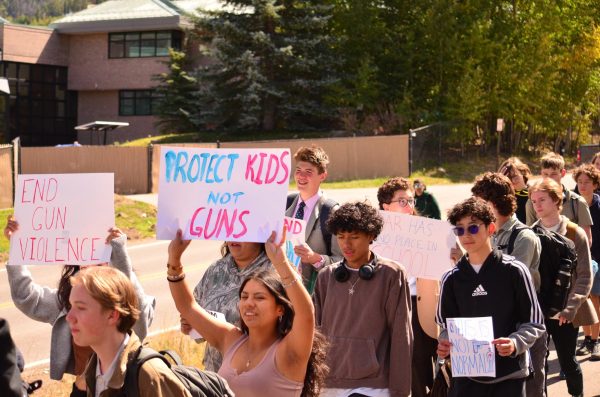Climate Change and You
Looking up to a brighter, and hopefully still cold, future.
The obvious effects of climate change–heat waves, storms, and coral bleaching–overshadow an equally important, but less prominent impact: mental health.
While correlations have been drawn between mental illness, suicide, aggressive behavior, and climate change, the much more apparent effect is easy to see outside of a targeted study. Climate change is out of our individual control (unlike relationships or substances), and humans cannot make decisions that will directly impact them. Feelings of depression and helplessness arise from the theoretical future of desolation that climate change could make a reality. Indirectly, climate change led to a rise in aggressive behavior and violent suicides.
Recently suicide rates have increased due to climate related factors. Heat waves can lead to suicides, higher crime rates and violence. Droughts lead to high levels of stress and possible climate refugees; farmers are increasingly more at risk of suicide, especially in India or even here in Colorado. Farming communities already struggle with suicide; rural communities have nearly double the suicide rates as urban areas. Droughts only contribute to heightened feelings of anxiety and depression. There is also a correlation between PTSD, stress and climate-related natural disasters, such as extreme storms or bushfires.
The Marshall fire last year that burned 1,100 residences on the front range was exacerbated by climate change; many families lost everything due to the fire growing at a larger rate than officials expected, burning homes before proper evacuation notice was given. Lives were destroyed and in the current housing market, it is unlikely that many people will recover to where they were before the fire. Climate refugees are fleeing the world’s deserts and coastlines, and locally, our town’s economy relies on a colder climate.
Younger generations struggle knowing that their future specifically will be affected by climate change. Eske Roennau, an AHS senior, struggled with despair and fear about climate change, leading him to join multiple environmental activist organizations like CORE and POW to make a difference for his future.
“Fear is obviously a really powerful emotion,” Roennau said. “I channeled it in an effective way towards activism in the case of climate. At the same time, it can also be really harmful if it’s not understood and not used properly.”
Fear controls how we act toward issues like climate change, especially in the case of people who will be directly affected by it. A couple of years ago, I attended a talk led by the Guerrilla Girls, an extremely left-leaning organization that lobbies for women’s rights. While I never saw their faces – they maintain anonymity through a gorilla mask, I appreciated what they talked about. It was potent and empowering. Shortly after the talk, I approached the speakers and mentioned climate change, one of them said, “The future is in your hands; your generation is the future.”
The women were elderly, that much was obvious. Saying that to a teenager is not an effective way to incite activism. To pass someone’s future onto them when they aren’t taken seriously only adds hopelessness. Earth supports all of the human race, not just Generation Z.
To those who tell the young people in your life that they will be the ones to make a change, rethink the impact of your words. Help save your children and future generations to come. If you have the power to make a difference, there is no reason to pass off your responsibilities to someone else who has less ability to be a positive influence on their planet. After all, almost all politicians are elderly and children cannot hold positions of power; they should be taking action for future generations. You can’t wait for younger people to take power. Be a better person and help people who can’t help themselves.
Aspen is a privileged bubble, making it hard to visualize how other people are affected by things like climate change or poverty. Migrants, including climate refugees, are more likely to experience schizophrenia than the populations they are moving into.
Politically inciting fear is an easy way for candidates to gain support by convincing people they can get rid of the problems that cause the fear. In the past, political candidates of both political parties pushed for climate reform. Republican John McCain contributed lasting positive changes to the US’s political activism. However, Donald Trump abolished environmental protections and moved America away from the leading edge of climate activism. Trump reinvigorated fossil fuel usage and undid years of reform to energy production.
Agencies like POW lobby for reform federally, however, local organizations like Aspen Center for Environment Studies (ACES) are integral to local climate activism. This being said, even ACES employees struggle to deal with climate change from a mental health standpoint, according to Adam McCurdy, the forest and climate director of ACES.
“It’s [climate change] a global issue, obviously. And so because individuals get very little autonomy over what happens and I think that that can really lead to feelings of helplessness, and that can be really demoralizing,” McCurdy said.
India has had a huge influx of mental health problems relating to climate change. Farmers have been hit hard by droughts and heat waves and crops have come up short all over the world. The global food supply, already running thin, has been tightened by global conflict and climate change.
The San Juan valley in Colorado is being hit by drought the hardest. Farmers are the second most at-risk group for suicide in Colorado. Spikes in drought correlate to suicide rates. Farmers also are more comfortable with firearms unfortunately, one of the most lethal methods of suicide. Lack of support or unwillingness to seek professional help contributes to rapidly declining mental health. There aren’t many predictions for when the drought will end, but it is likely the drought will persevere through 2030, and likely longer. Life isn’t going to get much easier for farmers already at their limits, and mental health awareness is vital. Thankfully, mental health is recognized and there are always people who want to help. The national suicide prevention hotline is confidential and confidential and 24/7 via calling the number: 988.
Over the past 15 years, climate change activism has become much more mainstream; activists make headlines, and preventing global warming is a key topic in any political conversation. The worst-case scenarios have become a little less dystopian since the early 2000s. With climate activism seeming to wane more recently, younger generations, including myself, see the future of a climate change dystopia as more of a reality. Activists like Greta Thunberg have spread positivity and awareness. Organizations like POW make federal changes and incite outdoor enthusiasts to be active parts of their community.
“A lot of these groups [climate activist groups] have brought an interesting perspective where they are acknowledging the worst case, but I they are also injected a lot of positivity about what we can accomplish and what we can accomplish in a short timeline,” McCurdy said. “And things like the Pollution Reduction Act and the things individual states are doing have been results of that work.”

This is Beau's second year with The Skier Scribbler. He is a junior and is passionate about the environment. He likes to rock climb, ski, and be outside. ...


































